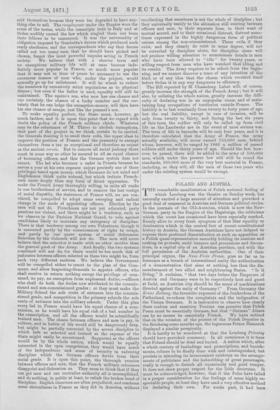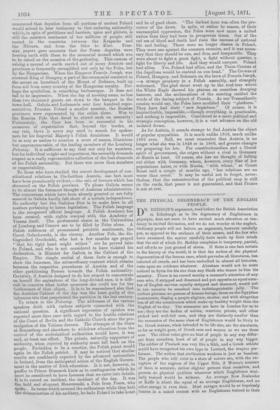POLAND AND AUSTRIA.
THE remarkable manifestation of Polish national feeling of which Lemberg was the theatre on Sunday week, has naturally excited a large amount of attention and provoked a good deal of comment in Austrian and German political circles. In the journals of the Old-Austrian, which is now the New- German, party in the Empire of the Hapsburgs, the criticisms which the event has occasioned have been especially marked. Keenly alive to every fresh symptom of that Slav equality or domination which is the central fact of recent constitutional history in Austria, the German Austrians have not delayed to express their profound dissatisfaction at such an apparition as a Polish quasi-representative assembly holding its sessions and making its protests, amid banners and processions and decora- tions, in a capital city of an Austrian province, and with the full permission of the Austrian authorities. One of their principal organs, the Nene Freie Presse, goes so far as to denounce as a breach of international amity the authorization of a demonstration that aims at nothing less than the dis- memberment of two allied and neighbouring States. " Is it fitting," it exclaims, " that two days before the Emperors of Austria and Germany were to be respectively host and guest at Ischl, an Austrian city should be the scene of machinations directed against the unity of Germany I" From Germany the Kreuz Zeitung, the favourite exponent of the Junkerdom of the Fatherland, re-echoes the complaints and the indignation of the Vienna Germans. It is instructive to observe how clearly these zealous and sensitive Teutons can perceive that Polish Posen must be essentially German, but that " German" Alsace
can by no means be essentially French. We have noticed that on the occasion of the protest of the Polish Deputies in the Reichstag some months ago, the ingenuous Prince Bismarck displayed a similar perspicuity.
It is hardly to be wondered at that the Lemberg Polentag should have provoked comment. In all conscience it is time that Poland should be dead and buried, A nation which, after a whole century of fusiladings and proscriptions, and banish- ments, refuses to be finally done with and existinguiehed, but persists in intruding its inconvenient existence on the arrange- ments of politicians and the hobnobbing of great personages, really is enough to disturb all equanimity and good temper. It does not show proper respect for the little decorum% It must be acknowledged, however, that if the Poles have failed in a proper consideration for the feelings of some highly re- spectable people, at least they have used a very effective method for declaring their own. For weeks past, it had been
announced that deputies from all portions of ancient Poland would attend to bear testimony to that enduring nationality which, in spite of partitions and barriers, spies and gibbets, is still the common sentiment of ten millions of people, still rooted in the countries between the Krapacks and the Niemen, and from the Oder to Kiev. Prus- sian papers gave accounts that the Posen deputies were bearing earth with them to the memorial mound which was to be raised on the occasion of the gathering. This custom of raising a mound of earth carried out of many districts and
provinces is frequently exemplified not only by the Poles, but by the Hungarians. When the Emperor Francis Joseph was crowned King of Hungary, a part of the ceremonial consisted in the ascent on horseback of the Mount of Defiance, built up from soil from every country of the Hungarian royalty. Per- haps the symbolism is something barbaresque. It does not fail to be impressive. When the day of meeting came, no less than two thousand guests sat . down to the banquet in the town-hall. Galicia and Lodomeria sent four hundred repre- sentatives, Prussian Poland a smaller number, the Russian provinces were represented by the exiles alone. Woe to the Russian Pole that dared to attend such an assembly I Fortunately, the Czar has been so successful in his measures of expatriation that, beyond the border, at any rate, there is never any need to search for spokes- men for his Imperial Majesty's Polish dominions. It would be as easy as useless to mention a score of names, illustrious but unpronounceable, of the leading members of the Lemberg Palmtop. It is sufficient to say that not only for numbers, but for individual weight and importance, the assembly demands respect as a really representative collection of the best elements of the Polish nationality. But there was more than numbers or respectability.
To those who have studied the recent development of con- stitutional relations in Cis-Leithan Austria, one fact must have been prominently evident,—the rain of favours which has showered on the Polish province. To please Galicia seems to be almost the foremost thought of Austrian administration. The concessions which have been already granted or are fully assured to Galicia hardly fall short of a certain independence. No authority but the• Galician Diet is to make laws in all matters pertaining to home legislation. The Polish language is the recognized official language. A Polish Academy has been created, with rights coequal with the Academy of Vienna itself. The professorial chairs in the Universities of Lemberg and Cracow are to be filled by Poles alone. A Polish nobleman of pronounced patriotic sentiments, the Count Goluchowski, is the viceroy. Another Pole, the dis- tinguished Grooliolski, who but a few months ago prayed " that his right band might wither " ere he proved false to Poland, and who is not considered to have violated his declaration, is Minister for Galicia in the Cabinet of the Empire. The simple recital of these facts is enough to show the immense, the extraordinary contrast which obtains between the respective procedures of Austria and of the other partitioning Powers towards the Polish nationality. Certainly, if Austria designed to do her utmost to concentrate on herself the aspirations of the long-divided race, it is diffi- cult to conceive what better measures she could use for the furtherance of that object. It is to be remembered also that the Austrian Cabinet of the day was the least guilty of the infamous trio that perpetrated the partition in the last century.
To return to the Po/67aq. The addresses of the various speakers dealt with various subjects connected with the national question. A significant expression of opinion was repeated more than once with regard to the hostile relations of the Court of Berlin and the Catholic Church since the pro- mulgation of the Vatican decrees. The attempts of the State at Brannsberg and elsewhere to withdraw education from the control of the ecclesiastical authorities would have, it was said, at least one effect. The priests, naturally supporters of authority, when rejected by authority must fall back on the people. Forbidden to be a courtier, the Polish priest would again be the Polish patriot. It may be noticed that similar results are confidently expected by the advanced nationalists in Ireland, from the anticipated action of the English Govern- ment in the matter of Irish education. It is not, however, to proffer to Prince Bismarck hints as to contingencies which he must be oonsidered to have foreseen that we enter into details. It is to record an incident, the incident of the day. It was the bold and eloquent Moszczenski, a Pole from Posen, who spoke. In terms which aroused the enthusiasm while they knit the determination of his auditory, he bade Poland to take heart and be of good cheer. "The darkest hour was often the pre- cursor of the dawn. In spite, or rather by reason, of their unexampled oppression, the Poles were now more a united nation than they had been in prosperous times. Out of the red sea of blood and death had risen the oneness of national life and feeling. There were no longer classes in Poland, They were one against the common enemies, and it was neces- sary that they should be one, and firm, and inseparable. They were about to fight a great fight, a fight without quarter, a fight for liberty and life. And they would conquer. Poland had allies. Yes, Poland had allies, and the Three Crowns of the Jagellons would be centred on one head." The Crowns of Poland, Hungary, and Bohemia on the brow of Francis Joseph, —a strange prophecy in a Polish assembly, and strangely welcomed. The glad shout went up to the roof-tree where the White Eagle showed his pinions on countless drooping banners, and the acclamations of the meeting ratified the words of the daring subject of Prussia. As our Transatlantic cousins would say, the Poles have modified 'their " platform." They have had their " new departure." Of course, it is impracticable, impossible,—though everything is practicable, and nothing is impossible. Considered as a mere political and strategic conception, however, it is a vast advance on the old isolated dream.
As for Austria, it sounds strange to find Austria the object of popular sympathies. It is much unlike 1848, much unlike 1866 even. Still, we must remember that Austria is no longer what she was in 1848 or in 1866, and greater changes are preparing for her. For constitutionalism and a liberal spirit of government, she reigns without a rival in Germany or Russia at least. Of course, she has no thought of falling out either with Germany, whom, however, every Slav of her populations hates, or with Russia, " with whom," as Count Beuet said a couple of months ago, " her relations are no worse than usual." It may be useful not to forget, never- theless, that the reconstruction of the political map is still on the cards, that peace is not guaranteed, and that France is not at rest.































 Previous page
Previous page